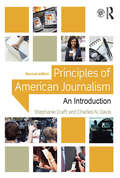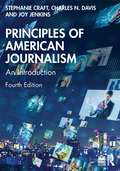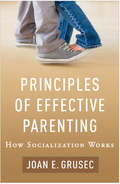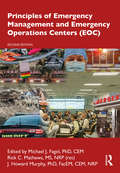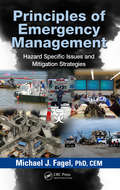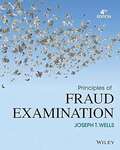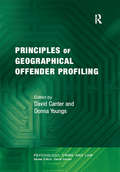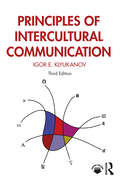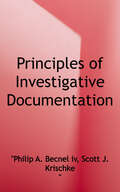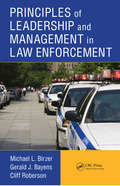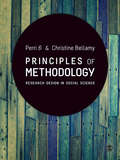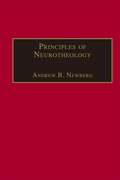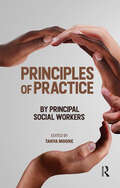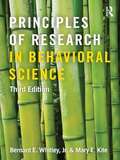- Table View
- List View
Principles of American Democracy Inquiry Journal: Impact California Social Studies
by McGraw-Hill EducationThis interactive print worktext is built around essential questions and permits students to develop their inquiry skills using analysis, primary sources, and evidence-based writing. Each chapter culminates in a Taking Action activity designed to translate learning into informed action.
Principles of American Journalism: An Introduction
by Stephanie Craft Charles N. DavisDesigned to engage, inspire and challenge students while laying out the fundamentals of the craft, Principles of American Journalism introduces readers to the core values of journalism and its singular role in a democracy. From the First Amendment to Facebook, the new and revised edition of this popular textbook provides a comprehensive exploration of the guiding principles of journalism and what makes it unique: the profession's ethical and legal foundations; its historical and modern precepts; the economic landscape of journalism; the relationships among journalism and other social institutions; the key issues and challenges that contemporary journalists face. Case studies, exercises, and an interactive companion website encourage critical thinking about journalism and its role in society, making students more mindful practitioners of journalism and more informed media consumers.
Principles of American Journalism: An Introduction
by Stephanie Craft Charles N. DavisDesigned to engage, inspire, and challenge students while laying out the fundamentals of the craft, this textbook introduces readers to the core values of journalism and its singular role in a democracy. From the First Amendment to Facebook, this popular textbook – now in its third edition – provides a comprehensive exploration of the guiding principles of journalism and what makes it unique. Authors Stephanie Craft and Charles Davis cover the profession's ethical and legal foundations, its historical and modern precepts, the economic landscape of journalism, the relationships among journalism and other social institutions, and the key issues and challenges that contemporary journalists face. They also discuss the current ambiguities and transitions – economic and technological – occurring in the field, from nonprofit news sites to social media’s effects on journalism. Filled with relevant case studies, exercises, and discussion questions that encourage critical thinking about journalism and its role in society, this book helps students become better-informed media consumers as well as more mindful practitioners of journalism. The companion website features chapter-by-chapter flashcards, quizzes, and annotated weblinks for students and a separate instructor resource section that features sample test questions, PowerPoint slides, sample syllabi, and chapter-by-chapter activities and discussion questions.
Principles of American Journalism: An Introduction
by Stephanie Craft Charles N. Davis Joy JenkinsDesigned to engage, inspire and challenge students while laying out the fundamentals of the craft, this textbook—now in its fourth edition—introduces readers to the core values of journalism and its singular role in a democracy.From the First Amendment to artificial intelligence, this popular textbook provides a comprehensive exploration of the guiding principles of journalism and what makes it unique. Authors Stephanie Craft, Charles N. Davis and Joy Jenkins cover the profession's ethical and legal foundations, its historical and modern precepts, the economic landscape of journalism, the relationships among journalism and other social institutions and the key issues and challenges that contemporary journalists face. They also discuss the current ambiguities and transitions—economic and technological—occurring in the field, from nonprofit news sites to social media’s effects on journalism.Filled with relevant case studies, exercises and discussion questions that encourage critical thinking about journalism and its role in society, this book helps students become better-informed media consumers as well as more mindful practitioners of journalism.
Principles of Archaeology
by T. Douglas Price Kelly KnudsonMethods can be difficult to teach in the classroom, with many instructors struggling to devise practical ways to help students understand how archaeologists work. Principles of Archaeology makes its mark by helping students learn by doing archaeological projects, by clear chapter-by chapter coverage of each archaeological method, and through videos that explore different aspects of archaeological practice, including scientific concepts and ethical considerations.
Principles of Data Management and Presentation
by Dr John P. HoffmannThe world is saturated with data. We are regularly presented with data in words, tables, and graphics. Students from many academic fields are now expected to be educated about data in one form or another. Yet the typical sequence of courses—introductory statistics and research methods—does not provide sufficient information about how to focus in on a research question, how to access data and work with datasets, or how to present data to various audiences. Principles of Data Management and Presentation addresses this gap. Assuming only that students have some familiarity with basic statistics and research methods, it provides a comprehensive set of principles for understanding and using data as part of a research project, including: • how to narrow a research topic to a specific research question • how to access and organize data that are useful for answering a research question • how to use software such as Stata, SPSS, and SAS to manage data • how to present data so that they convey a clear and effective message A companion website includes material to enhance the learning experience—specifically statistical software code and the datasets used in the examples, in text format as well as Stata, SPSS, and SAS formats. Visit www.ucpress.edu/go/datamanagement, Downloads tab.
Principles of Effective Parenting: How Socialization Works
by Joan E. GrusecGrounded in pioneering research, this authoritative text examines the parenting strategies that help children and adolescents develop into productive, happy members of society. Joan Grusec gives students and practitioners a roadmap for navigating the vast, seemingly contradictory literature on parenting. Rather than advocating one "best" style of parent–child interaction, Grusec identifies five domains of socialization and shows that different ways of responding to children are appropriate for each one. Chapters on each domain--protection, reciprocity, control, guided learning, and group participation--combine theory, empirical findings, cross-cultural considerations, and real-world applications. Personal recollections from culturally diverse young adults illustrate how parents helped impart important life lessons. Learning exercises present examples of children's behavior and invite the reader to select the most effective parenting action from several possible options.
Principles of Emergency Management and Emergency Operations Centers (EOC)
by Michael J. Fagel Rick C. Mathews J. Howard MurphyEmergency operations centers (EOCs) are a key component of coordination efforts during incident planning as well as reaction to natural and human-made events. Managers and their staff coordinate incoming information from the field, and the public, to support pre-planned events and field operations as they occur. This book looks at the function and role of EOCs and their organizations. The highly anticipated second edition of Principles of Emergency Management and Emergency Operations Centers (EOC) provides an updated understanding of the coordination, operation of EOCs at local, regional, state, and federal operations. Contributions from leading experts provide contemporary knowledge and best practice learned through lived experience. The chapters collectively act as a vital training guide, at both a theoretical and practical level, providing detailed guidance on handling each phase and type of emergency. Readers will emerge with a blueprint of how to create effective training and exercise programs, and thereby develop the skills required for successful emergency management. Along with thoroughly updated and expanded chapters from the first edition, this second edition contains new chapters on: The past and future of emergency management, detailing the evolution of emergency management at the federal level, and potential future paths. Communicating with the public and media, including establishing relations with, and navigating, the media, and the benefits this can provide if successfully managed. In-crisis communications. Leadership and decision-making during disaster events. Facilitating and managing interagency collaboration, including analysis of joint communications, and effective resource management and deployment when working with multiple agencies. Developing and deploying key skills of management, communication, mental resilience. Planning for terrorism and responding to complex coordinated terrorist attacks. Developing exercises and after-action reports (AARs) for emergency management.
Principles of Emergency Management: Hazard Specific Issues and Mitigation Strategies
by Michael J. FagelPrinciples of Emergency Management: Hazard Specific Issues and Mitigation offers preparedness and mitigation recommendations for advanced emergency planning. Because disasters are so unpredictable, advance planning is needed to effectively respond to and mitigate against the potential effects of such events.Whether a disaster is natural or man-made
Principles of Fraud Examination
by Joseph T. WellsPrinciples of Fraud Examination 4th Edition by Joe Wels contains engaging real-life case studies and an analysis of the complexity of frauds and fraudulent behavior incorporated throughout the book. This text provides a broad understanding of fraud—what it is and how it is committed, prevented, and resolved. Principles of Fraud Examination 4th Edition begins by providing an understanding of fraud examination methodology then documents the schemes used by executive, managers, and employees to commit fraud against their organizations. Case studies, complete with statistics and flowcharts, are provided for each chapter. <p><p>The primary focus of this text is maintained in the updated edition, with coverage of the actual accounting and human behaviors that lead to cases of accounting fraud. The 4th edition includes updates to reflect new and revised accounting standards and laws, updated statistics to include the most recent ACFE findings, and moderate changes to end of chapter material. Also included in the newest edition is updated coverage of recent examples of fraud accounting in the real world.
Principles of Game Audio and Sound Design: Sound Design and Audio Implementation for Interactive and Immersive Media
by Jean-Luc SinclairPrinciples of Game Audio and Sound Design is a comprehensive introduction to the art of sound for games and interactive media using Unity. This accessible guide encompasses both the conceptual challenges of the artform as well as the technical and creative aspects, such as sound design, spatial audio, scripting, implementation and mixing. Beginning with basic techniques, including linear and interactive sound design, before moving on to advanced techniques, such as procedural audio, Principles of Game Audio and Sound Design is supplemented by a host of digital resources, including a library of ready-to-use, adaptable scripts. This thorough introduction provides the reader with the skills and tools to combat the potential challenges of game audio independently. Principles of Game Audio and Sound Design is the perfect primer for beginner- to intermediate-level readers with a basic understanding of audio production and Unity who want to learn how to gain a foothold in the exciting world of game and interactive audio.
Principles of Geoarchaeology: A North American Perspective
by Michael R. WatersPresents the basics of geoarchaeology, through application of field techniques to a study of the late Quaternary of America. Alluvial, terrestrial and coastal environments are considered, as well as post burial physical disturbances of archaeological sites.
Principles of Geographical Offender Profiling (Psychology, Crime and Law)
by David Canter Donna YoungsGeographical Offender Profiling (GOP) is the term that has emerged for the examination of where offences take place and the use of that examination to formulate views on the nature of the offender and where s/he might be based. As such, it has become the cornerstone of 'offender profiling'. By its nature, GOP bridges psychology, geography, criminology and forensic science and is of academic interest to all those disciplines as well as practical significance to police investigators. This book brings together a cross-section of the major papers published in the field that lay out the concepts and foundations of this area - including some widely quoted but difficult to obtain 'classic' papers - with an introduction that puts the papers into an overall context and a concluding extensive bibliography of the publications relevant to this rapidly growing area.
Principles of Group Solidarity
by Michael HechterSocial scientists have long recognized that solidarity is essential for such phenomena as social order, class, and ethnic consciousness, and the provision of collective goods. In presenting a new general theory of group solidarity, Michael Hechter here contends that it is indeed possible to build a theory of solidarity based on the action of rational individuals and in doing so he goes beyond the timeworn disciplinary boundaries separating the various social sciences.
Principles of Intercultural Communication
by Igor E. KlyukanovThis third edition provides a comprehensive view of intercultural communication through its concise style and unique theoretical framework of ten interconnected principles.This edition engages students in active learning by showing how these principles come into play in their intercultural journeys. The new edition has been thoroughly revised, adding new ‘side trips’ and introducing ‘focus in theory’ boxes, chapter glossaries, and fresh examples with updated references. Each chapter again includes detailed case studies with question prompts that invite students to make connections between theory and their daily lives.This text is ideally suited for upper-level or graduate intercultural communication courses within communication, linguistics, and anthropology departments.New to this edition are online materials for instructors, including a test bank and suggested further readings and links to useful resources. Please visit www.routledge.com/9781032613079 to access.
Principles of Investigative Documentation: Creating a Uniform Style for Generating Reports and Packaging Information
by Philip Becnel Scott J. KrischkeThis is the only book in existence that discusses the process of documenting an investigation from start to finish. It presents just about everything an investigator needs to know regarding how to document an investigation. The first chapter discusses the five primary principles of investigative documentation: taking comprehensive notes; documenting every effort to contact witnesses and all surveillance; preparing reports whenever there is any possibility of needing to testify; taking verbatim statements from hostile witnesses and declarations from friendly witnesses; and providing all case documents to the client or maintaining a document retention plan. The second chapter details the numerous misconceptions pertaining to investigative documentation. This chapter sets the stage for the remaining chapters on note-taking, running resumes, reports, statements, and documentation retention. Each chapter is broken down into four or five sections that approximate the methods used to complete that particular documentary endeavor. The book also contains an exhaustive appendix that many investigators will find to be very useful, including: one that lists hundreds of abbreviations that investigators may find helpful when taking notes; sample reports that readers may use as templates for generating their own reports; an alphabetic stylebook that is based on styles used by the media and federal law enforcement agencies that provides a quick tool for properly referencing abbreviations, names, capitalization and numerals, among other topics; and several sample statements and declarations to show what these documents, when completed, are supposed to look like. This is an advanced book for people who already have the necessary skills to do an investigation. By following the principles outlined in this book, investigators will see the quality of their investigations improve markedly and ultimately be more successful.
Principles of Leadership and Management in Law Enforcement
by Cliff Roberson Michael L. Birzer Gerald J. BayensEffective police organizations are run with sound leadership and management strategies that take into account the myriad of challenges that confront today‘s law enforcement professionals. Principles of Leadership and Management in Law Enforcement is a comprehensive and accessible textbook exploring critical issues of leadership within police agenci
Principles of Leadership in School Psychology
by Lisa Kilanowski Kristine AugustyniakThis book provides a long overdue conceptual framework for integrating evidence-based principles of school psychology leadership across NASP (National Association of School Psychologists) domains of practice. It explicates the myriad ways in which school psychologists can and should serve as leaders across the NASP domains, examines the leadership role of school psychologists within each NASP domain, and presents both historical and contemporary contexts of the domains of practice. Key areas of coverage include:Concrete examples of school psychologists as leaders in the field.Spearheading initiatives and service delivery models involving consultation and collaboration.Academic intervention planning.Behavioral and mental health services.Crisis intervention and prevention.Consultation, program evaluation, and ethics of professional practice.The book offers a cogent framework for practitioners and trainers of school psychologists to further integrate principles of leadership into their work in the field. The volume culminates with a discussion of the role of school psychologists as advocates for the practice through legislative and social justice policy.Principles of Leadership in School Psychology is an essential resource for researchers, professors, and graduate students as well as professionals in school and clinical child psychology, educational policy and practice, and social work as well as all interrelated disciplines.
Principles of Methodology: Research Design in Social Science
by Perri 6 Christine BellamyThis book provides a comprehensive, accessible guide to social science methodology. In so doing, it establishes methodology as distinct from both methods and philosophy. Most existing textbooks deal with methods, or sound ways of collecting and analysing data to generate findings. In contrast, this innovative book shows how an understanding of methodology allows us to design research so that findings can be used to answer interesting research questions and to build and test theories. Most important things in social research (e.g., beliefs, institutions, interests, practices and social classes) cannot be observed directly. This book explains how empirical research can nevertheless be designed to make sound inferences about their nature, effects and significance. The authors examine what counts as good description, explanation and interpretation, and how they can be achieved by striking intelligent trade-offs between competing design virtues. Coverage includes: * why methodology matters; * what philosophical arguments show us about inference; * competing virtues of good research design; * purposes of theory, models and frameworks; * forming researchable concepts and typologies; * explaining and interpreting: inferring causation, meaning and significance; and * combining explanation and interpretation. The book is essential reading for new researchers faced with the practical challenge of designing research. Extensive examples and exercises are provided, based on the authors' long experience of teaching methodology to multi-disciplinary groups. Perri 6 is Professor of Social Policy in the Graduate School in the College of Business, Law and Social Sciences at Nottingham Trent University. Chris Bellamy is Emeritus Professor of Public Administration in the Graduate School, Nottingham Trent University.
Principles of Neurotheology (Routledge Science and Religion Series)
by Andrew B. NewbergFirst Published in 2017. Neurotheology has garnered substantial attention in the academic and lay communities in recent years. Several books have been written addressing the relationship between the brain and religious experience and numerous scholarly articles have been published on the topic, some in the popular press. The scientific and religious communities have been very interested in obtaining more information regarding neurotheology, how to approach this topic, and how science and religion can be integrated in some manner that preserves both. If neurotheology is to be considered a viable field going forward, it requires a set of clear principles that can be generally agreed upon and supported by both the theological or religious perspective and the scientific one as well. Principles of Neurotheology sets out the necessary principles of neurotheology which can be used as a foundation for future neurotheological discourse. Laying the groundwork for a new synthesis of scientific and theological dialogue, this book proposes that neurotheology, a term fraught with potential problems, is a highly useful and important voice in the greater study of religious and theological ideas and their intersection with science.
Principles of Politics
by Joe OppenheimerModern rational choice and social justice theories allow scholars to develop new understandings of the foundations and general patterns of politics and political behavior. In this book, Joe Oppenheimer enumerates and justifies the empirical and moral generalizations commonly derived from these theories. In developing these arguments, Oppenheimer gives students a foundational basis of both formal theory and theories of social justice, and their related experimental literatures. He uses empirical findings to evaluate the validity of the claims. This basic survey of the findings of public choice theory for political scientists covers the problems of collective action, institutional structures, citizen well-being and social welfare, regime change and political leadership. Principles of Politics highlights what is universal to all of politics and examines both the empirical problems of political behavior and the normative conundrums of social justice.
Principles of Practice by Principal Social Workers
by Tanya MooreA must-have text for social work students and practitioners which draws on the extensive years of experience of Principal Social Workers to shed light on contemporary issues.Principal Social Workers are highly skilled and experienced professionals who lead and support social work practice and develop new social workers and social care practitioners. They are senior managers but also remain actively involved with frontline practice so they can report on the views and experiences of practitioners at all levels. Their experience and knowledge is a hitherto untapped goldmine. This book draws upon the years of experience that are represented within the role and gives a voice to the experience of PSWs. Accessible and accurate, these chapters discuss contemporary practice issues such as sustainability, poverty and racism. Common to all the chapters is the central position of the relationship in social work practice. This book will give food for thought to any social worker or social work care practitioner. This book offers a refreshing and accessible take on contemporary practice issues. Presented in an accessible style, each chapter displays an area of practice that has personal resonance for the author. It encourage critical thinking by taking a broader concept and asking the reader 'what does this mean for social work practice?'
Principles of Research in Behavioral Science: Third Edition
by Bernard E. Whitley Jr. Mary E. KiteIntended for beginning graduate or advanced undergraduate students, this book provides a comprehensive review of research methods used in psychology and related disciplines. It covers topics that are often omitted in other texts including correlational and qualitative research and integrative literature reviews. Basic principles are reviewed for those who need a refresher. The focus is on conceptual issues - statistics are kept to a minimum. Featuring examples from all fields of psychology, the book addresses laboratory and field research. Chapters are written to be used independently, so instructors can pick and choose those that fit their course needs. Reorganized to parallel the steps of the research process, tips on writing reports are also provided. Each chapter features an outline, key terms, a summary, and questions and exercises that integrate chapter topics and put theory into practice. A glossary and an annotated list of readings are now included. Extensively updated throughout, the new edition features a new co-author, Mary Kite, and:* New chapters on qualitative research and content analysis and another on integrative literature reviews including meta-analysis, critical techniques for today's research environment. * A new chapter on exploratory and confirmatory factor analysis that addresses the use of path analysis and structural equation modeling. * A new chapter on how to write a research report using APA style.* Examples from cross-cultural and multi-cultural research, neuroscience, cognitive, and developmental psychology along with ones from social, industrial, and clinical psychology. * More on Internet research and studies.* Greatly expanded Part 3 on research designs with chapters on true experiments, field research, correlational and single-case designs, content analysis, and survey and qualitative research.* A website with PowerPoint slides for each chapter, a test bank with short answer and multiple choice questions, additional teaching resources, and the tables and figures from the book for Instructor's and chapter outlines, suggested readings, and links to related web sites for students. Intended as a text for beginning graduate and/or advanced undergraduate courses in research methods or experimental methods or design taught in psychology, human development, family studies, education, or other social and behavioral sciences, a prerequisite of undergraduate statistics and a beginning research methods course is assumed.
Principles of Safeguarding and Protection for Learning Disability Workers
by Simon BickertonIf you are working within the learning disability sector and studying for the QCF Diploma in Health and Social Care, you will find this book invaluable in helping you to achieve the unit on Principles of Safeguarding and Protection. You will learn how to recognise and respond to signs of abuse and how to reduce the likelihood of it happening. The book is easy to navigate, with each chapter covering one of the learning outcomes within the unit. Each chapter begins with an example taken from real people's stories and lots of activities, photographs and other illustrations are included throughout.

